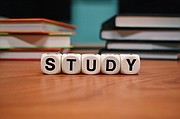8/9/2019

Books, pens, and your favorite device are in your backpack. New clothes hang in your closet. Lunches with healthy protein and nutritious sides have been planned. And your hair is done too. You are ready to go back-to-school, right? Partially right. If you have not put in any thought or effort into planning how this school year will be a success then you are not ready.
Have a Plan
Every great success story started with a plan. Benjamin Franklin, the founding father of the United States, once said, “By failing to prepare, you are preparing to fail.” Put a plan in place to succeed. One of the best ways to do this is to piggyback on the vision board idea by making a goal board. Dr. Jinneh Dyson, America’s ThinkUP guru, said a goal board is a visualization of whatever goals you want to achieve for the upcoming school year. Start thinking about what goals you want to accomplish for the year and place them on your board. Goals can be both academic and extracurricular. On your board can be things like making the honor roll, joining student council, being captain of the drill team, making it into the National Honor Society, and so. Whatever it is you want to accomplish during the year find a picture or something that represents that thing and place it on your board. And remember your board doesn’t just have to be a physical board. We live in the technology age. A goal board on a site like Pinterest works just as good. Just as long as you can see and reference your goal board throughout the year you are on the right track.
Tackling the Books
With your plan in place, next, you want to tackle how you going to approach studying this year. Knowing how you studying and doing it effectively can be the difference in C and A. Allow us to help you be the best student this school year with helpful tips for academic success.
Discover Your Learning Style
Everyone does not learn in the same manner. There are several different types of learners and knowing which you are will help with your academic studies. See if you can identify with any of the following:
*Visual Learner: You work best when there is something you can see. Having charts, diagrams, and graphs will better help you grasp concepts and information. You like visual representation to understand better.
*Auditory Learner: Sound is your friend. You have to hear information in order to retain. You speak concepts out loud. You talk things over with others.
*Reading/Writing Learner: You want to do just that read and write for better comprehension. There needs to be an interaction with text and words for you to be taught the material. You may read slowly to really absorb everything in your mind.
*Kinesthetic Learner: Your sense of touch is strongest. You take a hands-on approach to gaining knowledge. You learn better by doing and touching.
What kind of learner are you?
Create Your Plan of Study
Now that you know what kind of learner you are think about how you learn best. Do you study best when there is noise or do you need complete silence? Do you learn better working with groups or by yourself? Where will you study and for how long? All of these are questions to ask yourself when making your plan.
Next, you are going to want to create a place to study, preferably one that is distractions free. Ideally, you want to stay away from places that have silent distractions. Those are places like your bedroom. Study in there and you may be prone to want to go to sleep, watch TV, listen to music, mix and match fashion. See how many distractions I just named. Pick where you can really focus on the task at hand. Once you select the space then prepare it for your study session. Stock it with your necessary school supplies, brain powerful snacks, water, and lamp to ensure proper lighting.
Designate a time every day to study for at least 2hour. Make sure that time slot works for every day of the week. Studying at a set daily time on a regular basis will help you develop a routine thereby making it easier for you to retain information. A planner would be helpful for this step. Either paper or digital tool, planners give you a comprehensive outlook of your schedule so that you don’t overstretch yourself with activities and that you can properly allot time to study.
“It is hard to plan if everything is in your head so you want to put everything out,” said Dr. Dyson, who also noted that you should track homework deadline, tests, extracurricular activities, social activities, and study time.
Do Your Homework
Here homework is in reference to the things you need to do as a successful student. Go to all scheduled classes and arrive on time. Sit close to the front of the class to be able to take good notes and listen attentively. Record class lectures to review later when you study. Be an active, engage learner.
Dyson adds to also use class time wisely. Sometimes in class, you will have some downtime. Instead of chatting it up with friends, why not review your class notes and ask your teacher about any questions you may have. Go over your test scores. See where your problems where so you can, again, ask the teacher for help to understand the concept better.
But remember to make an important connection in class as well. Find that person who has that achiever mindset like you. That way you will have a study partner. In addition, just connecting with your classmates in a personal manner helps you become a well-rounded person. Remember to connect with people for support and as an added a resource.
Get to Work
Before you begin any study prepare your mind and body. Set a goal for each session whether that is to read so many chapters and/or complete a certain number of problems. Plan, which subjects you, are going to study. Start with your most difficult classes first because that is going to take the most energy mentally and physically for you.
If you decide to study with a group make sure that you also carve out some time to study by yourself. Group study sessions are great ways to review the material with others. If you can teach someone else the concept you are trying to grasp then you know you have really got it.
When studying alone I would highly suggest rewriting your notes and color coating them so certain points stand out and that your notes are well organized. Listen to your recording from class to make sure you didn’t miss any key information. Jot questions that you have to ask the teacher for further explanation. Make flashcards for quick study later. Take practice tests in similar settings to know how you will take the real test. Utilize resources like after school tutoring, finding old exams, and utilizing a teacher’s office hours. Reward yourself after achieving mini goals. For example, after you read one chapter you may reward yourself with a cookie. Don’t forget to schedule breaks as well. Over studying can be just as bad as not studying.
Another important aspect of learning is sleep and nutrition. Don’t stay up all night when you have class the next day, especially when you have an exam coming up. If you are exhausted you will not work at your best. Eat a well-balanced meal full of food to boost your brainpower like blueberries, fatty fish, turmeric, broccoli, pumpkin seeds, eggs, leafy green vegetables, nuts, and dark chocolate. Hunger will bring on headaches and cause you to be distracted.
Assess and Evaluate Your Results
Once assignments and tests are graded and return, review them to see where you did well and where you could improve. Did you do better with fill in the blank type questions or essays? Did you retain all the critical information for a given subject matter or did you miss some steps in the process? Did you not quite have a clear understanding of certain topics? Knowing the answers to the above questions will let you know how to plan your next study session.
A good way to do this is by using the TWEAK method. Nicole L. Gray of Nic of Time Tutoring says, “fast girls twerk; smart girls TWEAK.” TWEAK is an acronym for assessment and evaluation of your academic performance to drive success.
TWEAK stands for:
T - taking a moment to write down your methods.
How did you study and/or prepare for the assignment or test?
W - what worked…what didn’t?
How did you study for the questions you got right vs. the ones you got wrong.
E - evaluating why/how a method worked or didn’t.
A - asking yourself what you can do to improve.
Look at where you went wrong. How could you have changed it? How can you improve on the areas that went right?
K - keep fine-tuning your methods until you achieve optimal performance.
Gray added, “Assessment and evaluation serve distinct purposes when tweaking the methods used to achieve academic success. An assessment involves asking what methods worked or didn’t work, Evaluation involves asking why methods worked or didn’t and how your methods can be improved. “
Now that you have a plan of action, remember to work it all year. And when this school year is over just see if you met your goals or exceed them.
Houston Style Magazine extends best wishes to all students, faculty, and staff for a successful school year.

